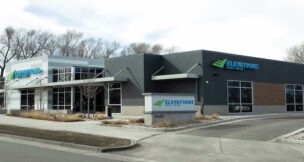Experts Discuss Top Issues Impacting Colorado Businesses


Experts Discuss Top Issues Impacting Colorado Businesses

What does 2019 hold for Colorado businesses and the economy? Rick Pederson, chief strategy officer at Denver’s Bow River Capital Partners, believes the state’s economy will continue to grow and that a mild recession is still a few years off. He and other financial experts recently met at the Citywide Banks annual forecast forum to discuss issues ranging from employment and consumer spending to real estate and legislation. Among other presenters were Maria Garcia Berry, founder and chairman of the Board of Denver’s CRL Associates, Inc. and more than 400 local CEOs and senior executives from across the Front Range.
(See a full video replay of the forum.)
The Big Picture
Pederson says that while the global economy is declining, he does not expect the United States (or Colorado) will experience a recession until 2021. He predicts it will be much like the relatively mild one we experienced in 2000 and 2001.
Garcia Berry discussed the impacts of Colorado’s shifting demographics and the extensive pipeline of legislative initiatives expected to unfold in 2019 and 2020. She says that these legislative issues will likely include potential changes to Colorado’s Taxpayer Bill of Rights law (TABOR) to enable the state to reallocate more surplus funds rather than refunding to taxpayers. The state gained significant surplus funds from last year’s federal tax cut act. Garcia Berry says much of the other new legislation will be focused on empowering consumers or employees against larger organizations.
Employment and Wages
Businesses are having challenges finding workers in Colorado and across the country. This is especially true for trucking, health care and retail workers. Pederson predicts more labor shortages are looming. During 2018, the U.S. added an average of 225,000 jobs per month and unemployment sustained record low levels. Pederson suggests, however, that this is not sustainable due to a shortage of available people in the workforce. He predicts the 2019 job growth numbers will slow to 150,000 per month, and unemployment will stay relatively flat at levels just below 4 percent.
In Denver, Pederson says the area’s job growth will slow from the 3 to 4 percent posted in recent years to just 2 percent in 2019.
The tight labor market is pushing wage growth. Pederson says that average wages increased 3.2 percent in 2018 and were significantly higher in health care, construction and other segments. In 2019, he expects this to increase to 3.5 percent.
Consumer Spending
An integral piece of a strong economy is consumer spending. If wages are rising, as suggested by the latest reports, does that translate to increased spending? Pederson says it does and cites that last year’s 2.7 percent increase in retail spending. He expects this rate of spending growth to continue in 2019.
“One worry I have is that you’re seeing the U.S. savings rate go down, but the spending rate is staying the same,” Pederson says. “Therefore, one of two things are happening. Either you and I feel our incomes are going to grow so we are spending ahead of that. Or we are borrowing on credit cards to keep up the standard of living. The first one is probably alright and the second is not good. Nonetheless, I think it’s going to be a reasonable year in consumer spending. That is going to be very important to keep us out of a recession.”
Pederson says two spending indicators that show early signs of a declining economy. Recreational vehicle shipments and light truck sales are both trending downward, which is concerning. “These two indicators are the beginning of the end (economic growth),” Pederson says. “How soon the end comes is dependent upon overall consumer spending. I do think it (a recession) still is some time out. But we are seeing some early signs.”
As a side note, Pederson says business spending is slowing slightly but will still grow this year around 2 percent.
Debt
U.S. consumers currently hold $14 trillion in outstanding debt. The key segments include residential mortgages ($10 trillion), auto loans ($1.5 trillion), student loans ($1.5 trillion) and credit card debt ($1 trillion). Pederson says that despite the high debt levels, the impact to the economy may be limited due to wage growth and consumer spending levels. “Household debt to income is at decades high,” Pederson says. “And as long as that remains good, we are in reasonably good shape.”
One segment Pederson is watching closely is the $1.5 trillion in auto loan debt. “What concerns me is the sub-prime portion of that,” Pederson says. “I think the auto sales boom is going to subside for a bit. No crash, but it is going to go down. This is nothing like what we saw with sub-prime mortgage debt. But it is a component of the next downturn.”
The other concern for Pederson is rising student loan debt at $1.5 trillion. “It is a worry,” he says. “The default rate is high, in the double digits. The difference between student debt and sub-prime mortgage debt is that the collateral (the borrower) doesn’t decline in value.” He doesn’t see a looming crisis, but it is another component that restrains consumer spending and impacts the overall economy.
Inflation
As mentioned previously, wage growth is expected to continue to rise in 2019 across all employment sectors. Pederson doesn’t believe increased wages will significantly boost inflation this year. “Part of the reason why inflation will stay low is that oil prices remain low and are expected to stay low,” he says.. He expects oil to remain priced around $55 per barrel in 2019. Low prices in key retail products, such as airline fares, fruits, vegetables, apparel, electronics and new cars, will also help stave off inflation.
There are some areas that will continue to see increased costs for consumers. A big concern over the past few years, especially in metro Denver, has been the rising rates of apartment rentals. Pederson says that rent increases are finally starting to slow. The overall housing market is expected to see more normal growth as inventory becomes more aligned with demand.
Restaurants and entertainment are another retail segment seeing increased prices. A large part of this is the recent increase in minimum wage. Pederson says pricing also continues to rise in health care and related industries like insurance.
Denver has consistently outpaced U.S. inflation for the past few years. Pederson suggests that Colorado’s inflation rate is finally starting to slow. He expects local inflation levels to drop under 3 percent from recent levels that were just under 4 percent.
Colorado’s Growth Impacts
Colorado and Denver are still attracting new businesses and new residents. The cost of living, traffic congestion and other factors, however, are attracting many newcomers to Fort Collins, Colorado Springs and Greeley, instead of Denver. Millennials moving to Colorado are selecting Colorado Springs over other cities. Denver still has growth levels above the national average, but it has dropped to number 17 in the country behind hot areas like Orlando, Phoenix and Houston.
The boom over the last decade has created a shift in demographics across the state. According to Garcia Berry, Colorado will soon get another district and electoral vote. That has a lot of implications locally as well as in the upcoming 2020 national elections. Sixty percent of the state’s population now lives in the seven counties that make up metro Denver. “It’s harder and harder to find statewide solutions to statewide problems, like water management and transportation issues,” Garcia Berry says.
Multiple polls, including a Citywide Banks poll of this event’s attendees, reflect the growing frustration of traffic congestion across metro Denver. Garcia Berry says that there is a connection to the high cost of living in metro Denver and increasing traffic. People are finding a need to live further out and that increases commuting distances. It’s a big issue that Denver, other municipalities and the state’s legislature face in 2019.
Expected Legislative Push
According to Garcia Berry, Colorado’s new Democratic governor and legislature are expected to introduce legislation focused on helping consumers and employees against large organizations. These include health care and pharmaceutical pricing transparency, environmental restrictions for oil and gas exploration, new statewide minimum wage requirements, employer limitations on job applications, family medical leave act requirements on employers and others.
(This sponsored content was provided by Citywide Banks.)
About Steve Ebner: Steve Ebner is the vice president of marketing and PR at Citywide Banks. Citywide Banks is a subsidiary of Heartland Financial USA, Inc. (NASDAQ: HTLF) and a member FDIC. Learn more at www.CitywideBanks.com.













